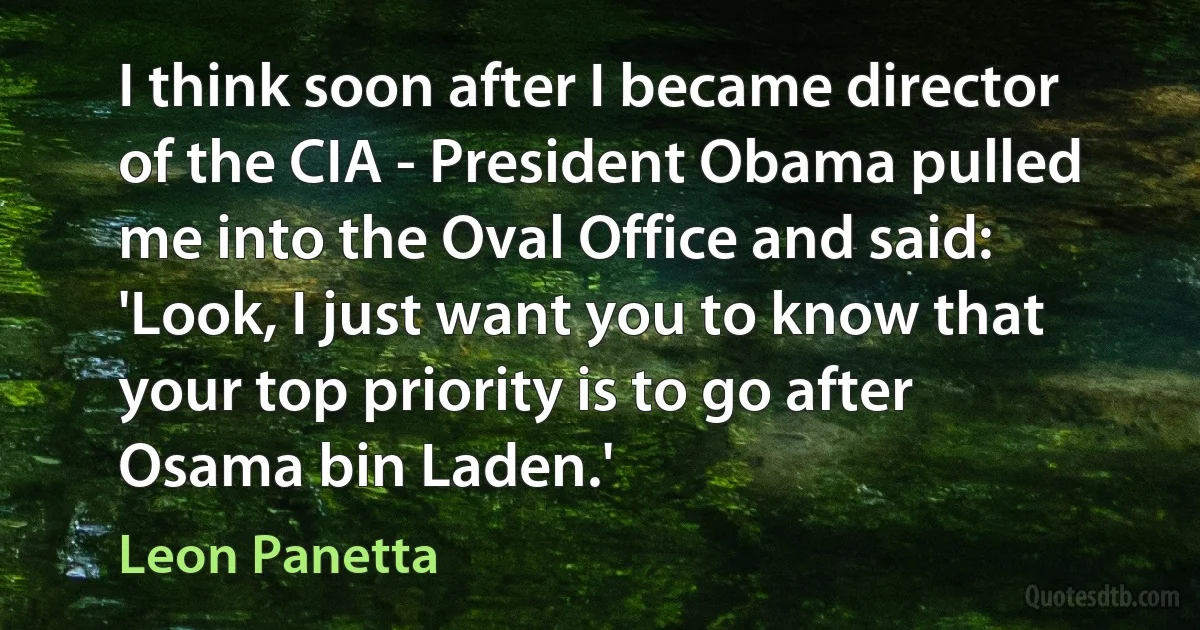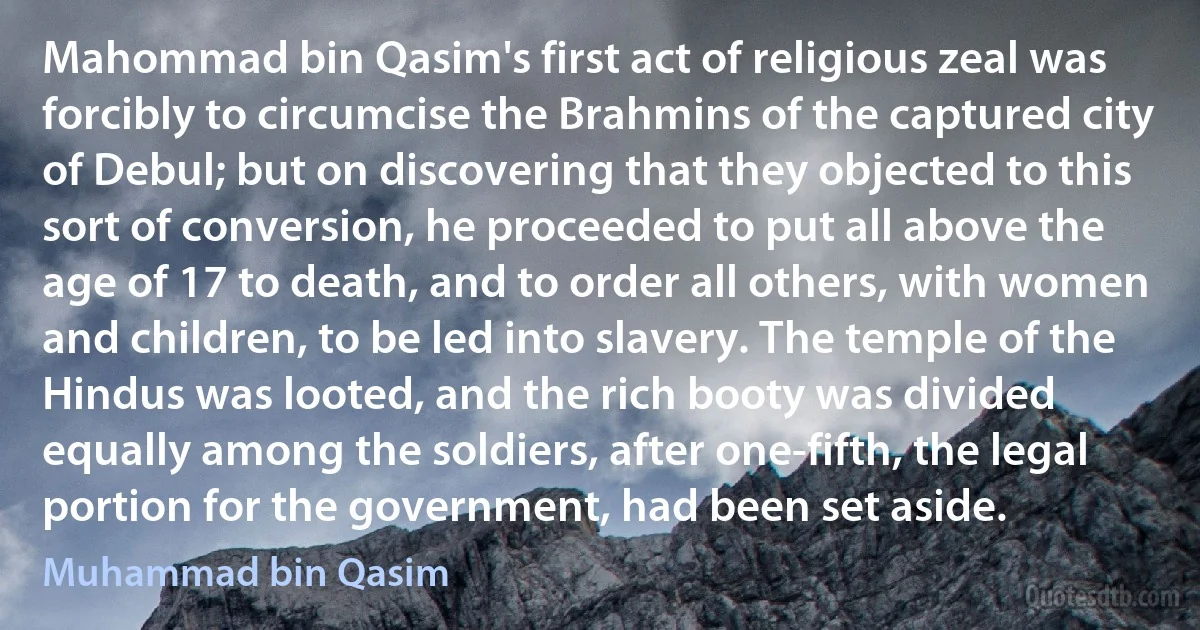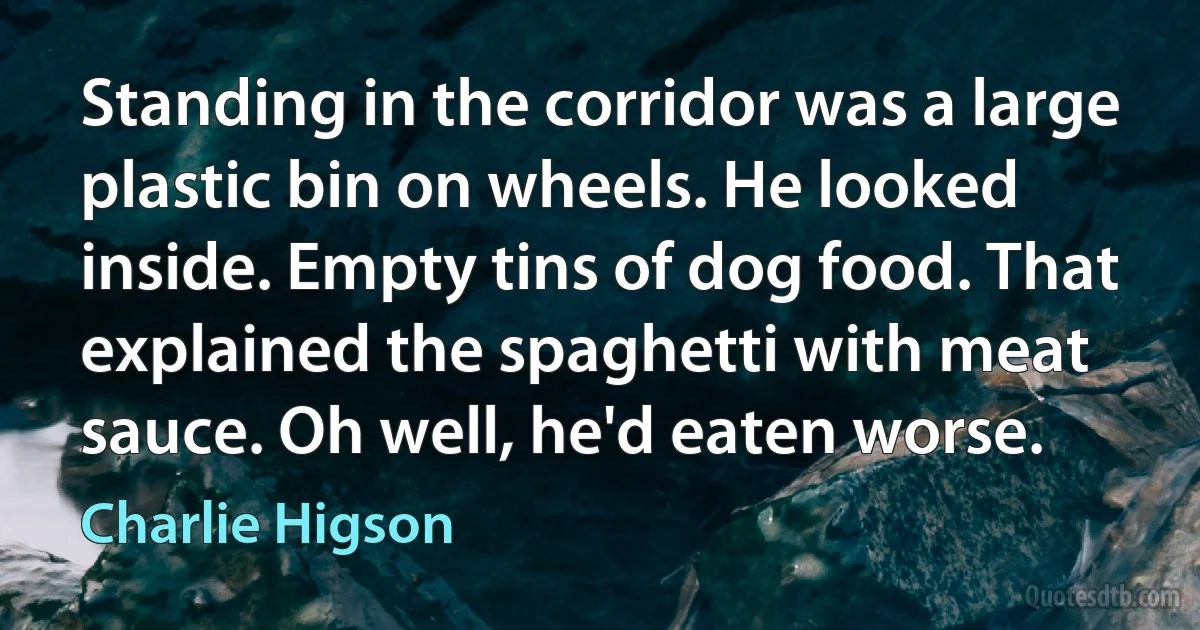Bin Quotes - page 6
When I heard the news that Osama bin Laden was killed by U. S. forces in Pakistan, I had a lot of questions. And one of the people I wanted to talk to was Lawrence Wright. He's joined us several times on the show. He won a Pulitzer Prize for his 2006 book The Looming Tower: Al-Qaida and the Road to 9/11, which is based in part on more than 500 interviews, including interviews with friends and relatives of bin Laden.

Lawrence Wright
Al-Harith bin Hisham asked Allah's Apostle O Allah's Messenger How is the Divine Inspiration revealed to you? Allah's Messenger replied, Sometimes it is like the ringing of a bell, this form of Inspiration is the hardest of all and then this state passes off after I have grasped what is inspired. Sometimes the Angel comes in the form of a man and talks to me and I grasp whatever he says. Aisha added: Verily I saw the Prophet being inspired Divinely on a very cold day and noticed the Sweat dropping from his forehead.

Aisha
Somnat - A celebrated city of India, is situated on the shores of the sea, and washed by its waves. Among the wonders of that place was the temple in which was placed the idol called Somnat' When the Sultan Yaminu-d Daula Mahmud bin Subuktigin went to wage religious war against India, he made great efforts to capture and destroy Somnat, in the hope that Hindus would become Muhammadans. He arrived there in the middle of Zil K'ada AH 416 (December AD 1025). The Indians made a desperate resistance' The number of slain exceeded 50,000.

Mahmud of Ghazni
The agriculturists in this part of the country were Jats, and they made their submission and were granted protection. When all these circumstances were communicated to Hajjaj [Muhammed bin Qasim's uncle], he sent an emphatic answer, ordering that those who showed fight should be destroyed, or that their sons and daughters should be taken as hostages and kept. Those who choose to submit, and in whose throats the water of sincerity flowed, were to be treated with mercy, and their property secured to them...

Muhammad bin Qasim
Janaki was one of the daughters of King Dahir of Sindh. She was captured along with her sister and sent to the Khalifa at Baghdad. When the Khalifa invited Janaki to share his bed, she lied to him that she had already been violated by Muhammad bin Qasim. Her sister supported her statement. The Khalifa ordered that Muhammad be sewed up in raw hide and sent to his court. Muhammad was already dead when the chest containing him arrived in Baghdad. Janaki accused the Khalifa of having killed one of his great generals without making proper enquiry. She said, 'The king has committed a very grievous mistake, for he ought not, on account of two slave girls, to have destroyed a person who had taken captive a hundred thousand modest women like us,... and who instead of temples had erected mosques, pulpits and minarets.

Muhammad bin Qasim
At the time of Muhammad bin Qasim's invasion of Sindh the head of the State was the Caliph and prisoners taken in Sindh were regularly forwarded to him. Kufi, the author of the Chachnama, rightly sums up the position. Out of the total catch, four-fifths was the share of the soldiers, "what remained of the cash and slaves was... sent to Hajjaj (the Governor of Iraq )” for onward transportation to the Khalifa. In such a situation any special acquisition had to be paid for in cash. Muhammad bin Qasim who wished to possess Raja Dahir's wife Ladi, avers the Chachnama, "purchased her out of the spoils, before making her his wife.” But the price he paid is not mentioned. Similarly, when Hajjaj sent 60,000 slaves captured in India to the Caliph Walid I (705-715 C. E.), the latter "sold some of those female slaves of royal birth”,5 but again their price has not been specified.

Muhammad bin Qasim
In a letter Hajjaj instructed Muhammad bin Qasim on how to deal with the adversary. "The way of granting pardon prescribed by law is that when you encounter the unbelievers, strike off their heads... make a great slaughter among them... (Those that survive) bind them in bonds... grant pardon to no one of the enemy and spare none of them” etc., etc.

Muhammad bin Qasim
When Hajjaj, the governor of Iraq, asked the Caliph for permission to send another expedition, the Caliph wrote back: "This affair will be a source of great anxiety and so we must put it off, for every time an army goes, [vast] numbers of Mussalmans are killed. So think no more of such a design.” But Hajjaj was a very tenacious imperialist. He spent the next four years in equipping an army more formidable than any which had so far been sent against Sindh. While sending off his nephew as well as son-in-law, Muhammad bin Qasim, with this army in AD 712, Hajjaj said: "I swear by Allah that I am determined to spend the whole wealth of Iraq, that is in my possession, on this expedition.”.

Muhammad bin Qasim
In September 1979, on Defence of Pakistan Day, there was a long article in the Pakistan Times on Bin Qasim as a strategist. The assessment was military, neutral, fair to the soldiers of both sides. It drew a rebuke from the chairman of the National Commission on Historical and Cultural Research.
"Employment of appropriate phraseology is necessary when one is projecting the image of a hero. Expressions such as ‘invader' and ‘defenders,' and ‘the Indian army' fighting bravely but not being quick enough to ‘fall upon the withdrawing enemy' loom large in the article. It is further marred by some imbalanced statements such as follows: ‘Had Raja Dahar defended the Indus heroically and stopped Qasim from crossing it, the history of this sub-continent might have been quite different.' One fails to understand whether the writer is applauding the victory of the hero or lamenting the defeat of his rival?”.

Muhammad bin Qasim
Building an integrated, cost-effective, national health service that delivers quality care for all is one of the critical challenges facing anyone with a stake in global health. A mum doesn't divide the health of her family up into different bits when she goes to a health clinic: ‘vaccines', ‘malaria', ‘HIV'. For her a health centre is a health centre and a nurse is a nurse. When she goes to get help, she should receive integrated care for all her family's needs not just the one thing that centre, or health practitioner, happens to know about. We need to assign inefficient, parallel health interventions to the rubbish bin.

Jo Cox
After September 11th, you had core al Qaeda in Pakistan and Afghanistan with (Osama) bin Laden. Bin Laden was killed. You have al Qaeda growing in countries like Somalia, but most particularly in Yemen. And there's still substantial threat out of Yemen. And now you have the countries in the Arab Spring: Tunisia, Libya, Syria, Mali; Egypt most recently, where they're breeding grounds for radical extremists who may not stay there, but may present an attack. And, finally, you have, within the United States, the growth of homegrown, radicalized extremists who are radicalized on the Internet and then get their instructions for developing explosives on the Internet, as well.

Robert Mueller
Muhammad bin Tughlaq became notorious for enslaving captives, and his reputation in this regard spread far and wide... Ibn Battuta's eye-witness account of the Sultan's arranging marriages of enslaved girls with Muslims on a large scale on the two Ids confirms the statement of Al Umri. "First of all,” writes he, "daughters of Kafir (Hindu) Rajas captured during the course of the year, come, sing and dance. Thereafter they are bestowed upon Amirs and important foreigners. After this the daughters of other Kafirs dance and sing... the Sultan gives them to his brothers, relatives sons of Maliks etc. On the sixth day male and female slaves are married.” It was a general practice for Hindu girls of good families to learn the art of dancing. It was a sort of religious rite. They used to dance during weddings, festivals and Pujas at home and in temples. This art was turned ravenous under their Muslim captors or buyers.

Muhammad bin Tughluq
Strike a Bedu and he will kill you either then or later. It is easy for strangers to give offence without meaning to do so. I once put my hand on the back of bin Kabina's neck and he turned on me and asked furiously if I took him for a slave. I had no idea that I had done anything wrong.

Wilfred Thesiger
Well, you got to remember, bin Laden killed 3,000 Americans and, in some ways, he and his ideology killed tens of thousands of his fellow Muslims, including Pakistanis. I understand that that was provocative and complicated for Pakistan, but only if you accept the idea that he was an acceptable member of Pakistani society.

Sebastian Junger



